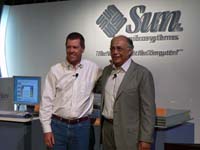Intel partners with Sun Microsystems on server chips
Server and software maker Sun Microsystems Inc. has agreed to use chips from Intel Corp. in some of its servers and for Intel to endorse Sun's Solaris operating system, a person close to the deal told the AP late Sunday night.

An announcement is expected Monday, according to the person, who requested anonymity because the deal had not been made public. Specifics of the arrangement were not disclosed.
The deal marks a major design win for Intel, the world's largest computer chip maker, which has been fighting to reverse plunging profits and regain market share lost to archrival Advanced Micro Devices Inc.
It's also a sizable victory for Sun as the company continues its long climb back to profitability following the dot-com collapse and seeks more mainstream adoption of its servers and software products.
Shawn Dainas, spokesman for Sun Microsystems, declined to comment. Intel spokesman Tom Beermann also declined to comment.
The partnership comes amid an intensifying fight for market share between Intel and AMD.
Both companies have been slashing prices and incurring heavy expenses in the transition to a more advanced manufacturing technology that will allow them to shrink the size of the circuitry on their chips.
They have also been waging an inch-by-inch battle for market share that has been particularly painful for Intel, whose previous generations of chips began falling out of favor for their high energy consumption.
Last year, Intel lost more than 5 percent of the overall computer chip market to AMD, according to Mercury Research. Longtime Intel loyalist Dell Inc. said it would also begin using AMD chips in its PCs and servers.
Some of AMD's most dramatic market-share gains have come in the high-margin server and laptop markets, areas where Intel traditionally had little competition.
However, Intel, which still commands about three-quarters of the overall chip market, fired back at AMD last year by unveiling a new line of chips based on an upgraded design that industry observers cheered for delivering higher performance while giving off less heat.
The competitive pressure appears to be taking its toll on AMD, which is scheduled to report fourth-quarter earnings on Tuesday and has warned investors that plunging processor prices would "substantially" reduce operating income for the quarter.
AMD's focus on energy efficiency helped the company lure away clients like Sun while Intel was still overhauling its product line.
AMD and Sun entered into a partnership in 2003, and in recent years Sun has relied exclusively on AMD to supply server chips based on the popular x86 microarchitecture, or design, used in many personal computers and servers.
Intel was also providing processors for Sun's x86 server line at the time, but was pushed aside out of concerns about the chips' power consumption.
Under the current deal, Intel will again provide chips for Sun's x86 line, though this time its Xeon processors are more powerful and boast dramatically improved energy-saving features.
Sun, which also makes its own line of Sparc branded processors, will still use AMD chips in some of its products, the person close to the deal said.
Sun, which is scheduled to report second-quarter earnings on Tuesday, is still clawing its way back to profitability after its gutting during the dot-com fallout.
The Santa Clara-based company has lost more than US$5 billion since 2002, after tech-related spending dried up and demand plummeted for high-priced servers like Sun's that were snapped up during the boom but fell idle after the dot-com bust.
Intel's endorsement of the company's Solaris operating system is also an important victory for Sun, as many servers that use chips based on the x86 design often run on Linux or Microsoft Corp.'s Windows operating system.
Rumors of a Sun-Intel partnership had circulated since Friday, when Banc of America Securities analyst Sumit Dhanda wrote in a research note that Sun was considering using Intel's Xeon processors for its fast-growing x86-based server product lines.
Though Sun is a "fairly small player" in the market for x86-based servers, coming in sixth in terms of market share, Dhanda said, the company's sales in that market are growing rapidly, reports AP.
Dhanda said such a partnership could allow Intel to gain as much as 50 percent of Sun's x86 business, which could translate into US$25 million to US$50 million in lost revenues for AMD.
"(W)hile the impact to Intel financials is not meaningful in the near-term, we think the shift away from AMD bodes well for momentum in Intel's server business over the course of the upcoming quarters," Dhanda said in the note.
Subscribe to Pravda.Ru Telegram channel, Facebook, RSS!


